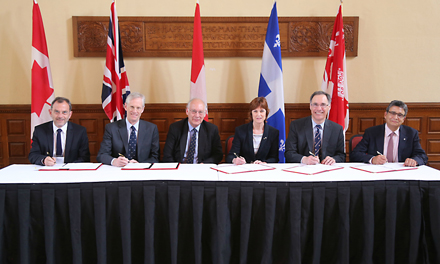
McGill, Oxford and Neuroscience Center Zurich sign three-way agreement
By Neale McDevitt
When it comes to relationships, three is often seen as a number to avoid, as triangles have long been the catalyst for tragedy and heartbreak. But earlier this summer, McGill entered into a triangular relationship that promises to turn that old adage of three being a crowd on its head.
On June 25, McGill, the University of Oxford and the Neuroscience Center Zurich (ZNZ) signed a tripartite partnership agreement designed to enhance collaborations in neuroscience investigation by developing new interdisciplinary interactions and creating synergies between researchers.
“This partnership brings together leading researchers from three of the world’s top centres of neuroscience. By working together, we can make significant contributions in research in everything from Alzheimer’s, Parkinson’s, amyotrophic lateral sclerosis and psychiatric diseases, to multiple sclerosis, cognition, chronobiology, neuroplasticity and pain,” said Dr. Claudio Cuello, the Charles E. Frosst/Merck Chair in Pharmacology and the Chair of Brain@McGill. “We are determined to make important inroads so we’ve had to step on the accelerator.”
In broad terms, the partnership will provide funding opportunities for collaborative projects; facilitate mobility of students and staff between the three institutions; and promote research initiatives bridging basic and clinical neuroscience, based on complementary expertise.
“This makes all three institutions significantly stronger while also allowing us to move in any direction,” said Cuello. “Say we have a project in Parkinson’s Disease. We may find that there are some molecular aspects that can be done better in Oxford, some imaging best done at McGill and another aspect in genetic components that is best handled in Zurich. By brainstorming and working together, we save time and energy while accelerating discovery.”
While the tripartite partnership is new, McGill has been in separate partnerships with both institutions for several years now.
The formal relationship with Oxford was established in 2009 and since then the two institutions have collaborated on more than 21 pilot projects ranging from the study of early childhood experiences and how they affect later health to the investigation of abnormal circadian sleep/wake patterns and the relationship with subjects who are at risk of developing psychotic disorders.
Christopher Kennard, Head, Nuffield Department of Clinical Neurosciences, Oxford, said he is thrilled to expand the partnership to include ZNZ because, at day’s end, it will be the patients who benefit.
“This tripartite agreement offers the opportunity to bring together world-class neuroscientists at McGill, Oxford and Zurich in collaborative programs of research in both the basic and clinical neurosciences,” said Kennard. “This will provide an unprecedented opportunity to enhance human health, particularly in neurological and psychiatric disorders
Read the full story in the McGill Reporter.
August 20, 2013
